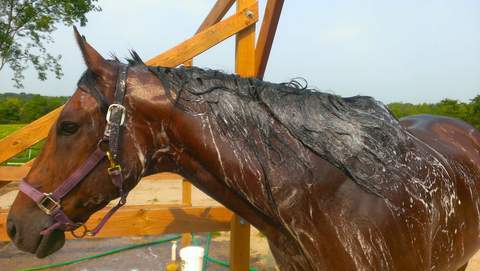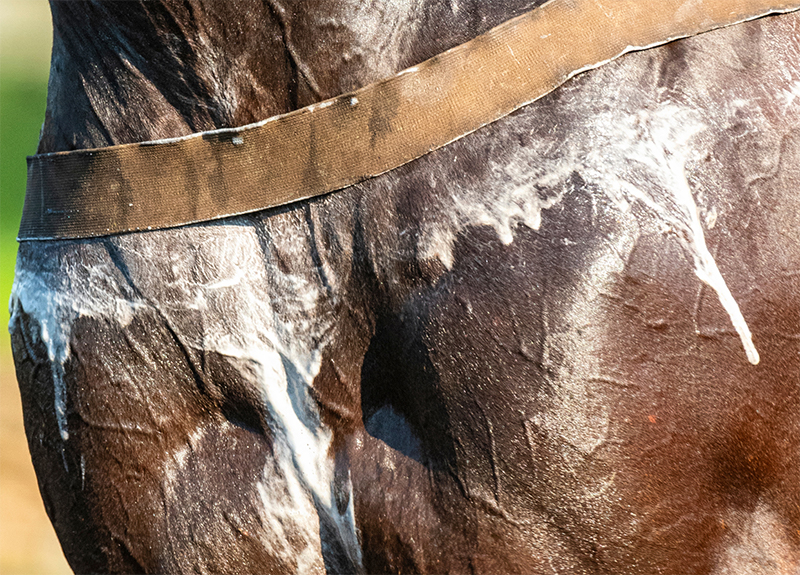Summertime in East Tennessee can be brutal, and these hottest days of August are of prime concern. Heat exhaustion in horses is a serious concern, especially during these hot and humid weather conditions. Horses can easily become overheated and suffer from heat-related illnesses, even just during normal activities. Heat exhaustion occurs when a horse’s body temperature rises to a dangerous level due to excessive heat and humidity, and its cooling mechanisms become overwhelmed. If this happens, quick action may save his life.
You must keep an eye on your horse’s well-being during this time. If he becomes overheated, by the time you can get him to shade, he has already expelled so much energy and fluids to try and cool that reversing this can be a challenge. Now, of course, your horse will sweat, and that is normal, but you have to make sure that he can rest, eat, and drink as much as he wants to of fresh, clean water so that he doesn’t deplete his precious inner reserves. Heat exhaustion is defined as a temperature of 104°F or higher and is a result of your horse not being able to dissipate heat because he has sweated to the point of dehydration. At this point, he is at risk of having a heat stroke which can cause brain damage, organ failure, and other serious, potentially fatal problems.

Symptoms of heat exhaustion in horses can include:
- Heavy sweating that becomes thick and sticky
- Lack of sweating when his skin is hot to the touch
- Rapid breathing and increased heart rate even while resting
- Elevated body temperature (over 103°F or 39.4°C)
- Lethargy or weakness, signs of depression
- Panting like a dog
- Dehydration
- Muscle tremors or stiffness
- When it takes more than six seconds for the skin on the point of the shoulder to flatten out after being pinched
- Lack of appetite
- Dark urine
If you suspect your horse is experiencing heat exhaustion, it’s important to take immediate action to cool them down and provide proper care:
- Move the horse to a shaded and well-ventilated area.
- Douse him with water – ice water is best. Drench him, scrape him dry, and repeat. Do not wait on the water to evaporate.
- If you have ice or cold packs at hand, press them around the large blood vessels under his throat to cool the blood flow to the brain. If you have enough ice packs, ask friends or family to hold them in place in his armpits or groin (only if he’ll let you).
- Offer cool, clean water for him to drink as much as he wants.
- If you have powdered electrolytes handy, add some to a second bucket of water and let him have access to both.
- Continue to use water to sponge the horse’s body, especially his neck, chest, and legs, to help lower his body temperature.
- Use fans or misting systems if available to promote cooling.
- Avoid overexerting the horse and allow him to rest.
DO NOT FORCE WATER INTO HIS MOUTH. IT CAN CAUSE ASPIRATION PNUEMOIA. DO NOT USE ELECTROLYTE PASTE. DO NOT GIVE HIM ANY MEDICATION – HIS KIDNEYS MAY HAVE ALREADY BEEN COMPROMISED AND MEDICATION CAN MAKE IT WORSE.
Call us and while you wait:
Monitor his vital signs, such as heart rate and respiration rate. It’s important to note that if he has refusing to drink within an hour, this is an emergency. He may need IV fluids to help him recover.
Tips:
- Avoid exercising or working horses during the hottest parts of the day.
- Clip or trim their coat to help with heat dissipation.
- Use fly sheets or light-colored blankets to protect them from the sun.
- Provide shade in their pasture or paddock.
- Monitor the weather forecast and adjust their routine accordingly.
- Learn to recognize the signs of heat stress and act promptly.
Remember that each horse is unique, and some may be more prone to heat stress than others. Regularly assessing their condition and taking steps to keep them cool and comfortable is essential for their well-being. If you have specific concerns or if your horse’s condition worsens, consult with us. Dr. Hancock is extremely knowledgeable about equine health and local climate conditions. Trust your horses to Rocky Valley Veterinary Service, your full-service mobile vet. Elite care at its finest! Our number is 865-566-8359.

Leave a Reply